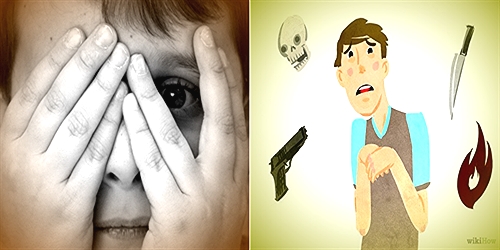Difference between Phobia, Fear and Anxiety

r
Fear is a natural state of a person but when it gets higher and goes beyond the limits. It knocks a scientific term Phobia or Anxiety. Almost everyone person has childhood fears, maybe of lizard, mice, crocodile, and tiger, and also dogs. Fears are normal and temporary based on the mindset. When fears go beyond the limits, it transcends the reality, it becomes Phobia which may lead to anxiety. According to doctors; Phobia is the most common mental disorder. Let’s study its difference between Phobia, fear, and anxiety.
What is Phobia?
Phobia is something, that poses danger but in reality, it deals with no actual danger.
The most common phobias include height phobia, highway driving, insects, needles, snakes,etc.
What is Fear?
Fear is something real, something associated with natural states.
What is anxiety?
Anxiety is the state of apprehension (worry), tension, and excessive concern over the danger that is either minor in degree or largely unrecognized. Following conditions are included in anxiety disorder:
- Panic disorder
- Phobic disorder
- Generalized anxiety disorder
- Obsessive-compulsive disorder
- Post-traumatic disorder
How to Overcome the Fear of Public Speaking https://researchpedia.info/how-to-overcome-the-fear-of-public-speaking/
Fear vs Phobia vs Anxiety:
What are the states of a victimized man?
If you have a phobia, you are likely to develop a fear of fear itself.
You may begin to worry that something will happen to trigger your fear.
You may start to change your daily routine in an effort to avoid any possible triggers.
On the other hand, if you get a simple fear, you will definitely spend much time thinking about the fear.
It will not affect your mindset until you are forced to confront it.
Whereas during an anxiety attack you may suffer from panic attacks which are manifested by sudden intense feelings of worry accompanied by the several of following symptoms:
Dyspnea (shortness of breath)
Palpitations (racing heart)
Chest pain (sometimes)
Discomfort
Chocking sensation
Dizziness
Vertigo
Paresthesias (tingling in extremities)
Hot and cold flushes
Sweating
Faintness
Sleep disturbances
Difficulty in concentrating
Now how come phobia, fear, and anxiety occurs:
Phobias can be of three kinds, which are as follows:
Specific phobia: In this phobia, there is a fear of specific objects like flying, dogs, heights, etc.
Social: In these kinds of phobias, you may confront social anxiety orders.
Agoraphobia: This phobia mainly deals with the places from where you cannot easily get escape.
Phobias can be permanent.
Fear is always concerned with the thought, feeling, or any past experience that can make you scared.
It’s natural and can come in many different forms.
It can occur while sitting in a darkness, in isolation.
It’s a temporary state.
According to doctors, fear is to be afraid at times.
Anxiety disorder consists of discrete episodes of extreme panic (panic attacks) that occur against a background of nervousness. It releases hormones and chemicals like norepinephrine, dopamine, adrenaline, and serotonin. So oxygen supply to the brain is increased and you respond in a better way to situations.
Now, what causes phobia, fear, and anxiety?
Phobia can come at a specific time, maybe at childhood, adulthood, and sometimes in aging.
Research has suggested that phobias could be linked to genetics, brain chemistry, and even gender, apparently, women are more likely than men to suffer from phobias.
On the other hand, there is no specific time for confronting fear.
It can be caused during an experience, during confronting anything.
There is no specific time for receiving fear.
Whereas anxiety is triggered by the following things or situations:
First day of your school or at any new place (where you have never been to)
Death of your loved one
Work pressure or stress
Going for a job interview
Financial problems
Giving a speech
Crowded places
Your exam day
Different personality types
What are the remedies? How to overcome these states:
Phobias can be dealt with in the same way such as cognitive behavioral therapy is one of the recent therapy for treating phobias.
Fear can be treated through exposure therapy. In this therapy, a person is shown to the feared object until he feels that there is nothing dangerous in it.
Anxiety can be reduced by the following ways:
Regular exercise
Healthy diet
Deep breathing exercises
Avoid cigarette smoking
Avoid alcohol consumption
Adequate sleep (7 to 9 hours)
In severe cases, drugs are prescribed such as
Anxiolytic drugs (benzodiazepines e.g alprazolam)
Antidepressant drugs (imipramine and selective serotonin reuptake inhibitors).
Best Foods that Reduce Stress and Anxiety https://researchpedia.info/best-foods-that-reduce-stress-and-anxiety/
Conclusion:
Concluding the whole, fear is something that is something temporary, more associated with the normal emotion, whereas phobias and anxiety are something permanent related to the specific situation. According to the psychologist, a person himself plays a vital role in demolishing the fear, phobias, and anxiety.


Leave a Reply